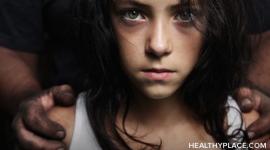Protecting Your Children From Sexual Predators
Online Conference Transcript

Debbie Mahoney Her former next door neighbor molested her son. Since then, Debbie has devoted her life to keeping children safe. She is the Founder and President of the child protection group, Safeguarding Our Children - United Mothers (SOC-UM). She has a new book out called "Innocence Lost."
David HealthyPlace.com moderator.
The people in blue are audience members.
David: Good Evening. I'm David Roberts and I'm the moderator for tonight's conference. I want to welcome everyone to HealthyPlace.com. Our topic tonight is "Protecting Your Children From Sexual Predators". Our guest, Debbie Mahoney, is author and founder of the child protection group Safeguarding Our Children-United Mothers (SOC-UM), which is a site inside the HealthyPlace.com Abuse Issues Community. We'll be discussing why children are at risk, what are the behavioral indicators of an abused child, how do you report child abuse, and the most important safety tips you need to know -- BEFORE anything bad happens to your child.
Debbie's son fell prey to her former next-door neighbor, and since 1996, Debbie's devoted her life and personal resources, and a lot of her energy, to protecting children. She also just came out with a new book called "Innocence Lost," which goes into more detail about some of the child abuse issues we'll be discussing tonight.
Good Evening, Debbie and welcome to HealthyPlace.com. We appreciate you being here tonight. How old was your son when he was abused by your former neighbor?
Debbie: Thank you for having me. Brian was between the ages of 10 and 12.
David: So, this occurred over a two year period. Did you have any idea what was going on?
Debbie: No. I had no idea. If I knew, I would have stopped it. Like most children, Brian did not disclose the abuse.
David: How did you find out?
Debbie: I found out because the perpetrator belonged to the group NAMBLA, a pedophile ring and there was a perpetrator in prison who gave up Jonathan Tampico's name. They did a search on his house and found a project that Brian and I had worked on. They found the school project and the police called me and that's when Brian disclosed.
David: So, I'm sure it came as a complete surprise to you, and an unpleasant one at that. I say that because I'm sure that's the situation most parents find themselves in -- after the fact.
Debbie: It was horrible. It's one of the worst nightmares a parent discovers. I was overwhelmed with guilt because I didn't know the child abuse was occurring.
David: Since tonight's topic is on "prevention," as you look back now, and it's been several years since this abuse happened, what do you think about?
Debbie: There were signs that something was wrong and I didn't know what those signs were. I attributed those signs of child abuse to other things, such as puberty, and just being a boy. But there were signs that abuse was occurring, which is why I'm a proponent of educating children.
David: You mentioned there were signs that abuse was occurring to your son, what are the warning signs that parents should be aware of?
Debbie: There are a variety of warning signs of child abuse. Behavioral indicators such as anger, chronic depression, poor self esteem, lack of confidence, problems relating with peers, weight change, age-inappropriate understanding of sex, frightened by physical contact or closeness, unwilling to dress or undress in front of others, nightmares, change in behavior, going from happy go lucky to withdrawn, change in behavior toward a particular person, suddenly finding excuses to avoid that person, withdrawals, self-mutilation.
It's important to remind people that any one of these signs of child abuse can be attributed to something and they should seek help through a mental health professional.
David: We, the general public, tend to think those child molesters are a certain "type," seedy people who can be easily spotted. Maybe that comes from TV and the movies. Is that a true portrayal?
Debbie: No. People who are child molesters are usually in a position of trust. They can be teachers, coaches, lawyers, police officers, family, friends. Child molesters are good at manipulation and are not wearing trench coats. The statistics for child sexual abuse are as follows:
- One-quarter of children sexually abused are abused by a biological parent.
- One-quarter of children are sexually abused by stepparents, guardian, etc.
- And one-half of children are sexually abused by someone that the child knows.
So three quarters are abused by someone other than the biological parent, but someone that the child knows.
David: Debbie, here are a few audience questions:
Eagle: How did you know he was part of NAMBLA?
Debbie: We found that out later. We didn't know that at the time. I found out during the investigation. The same man had top-secret government clearance, he worked at one of our national weapons labs and was a former big brother, and a tutor at a former school, and my next door neighbor.
lpickles4mee: What about all of these people just getting out of jail and moving in the neighborhoods?
Debbie: If we are talking about public disclosure, then I agree. Parents have a right to know. The recidivism rate for a convicted sex offender is higher than any other crime.
David: So considering that some molesters are "trusted" individuals, teachers, lawyers, even police officers, how can a parent reasonably protect their child from sexual predators, short of locking them up in a room 24/7?
Debbie: Well, I believe giving parents the info on who these sexual predators are. Public disclosure and educating children is the biggest advantage we can give our children. We can teach our children to be safe, not fearful. The biggest asset a sex offender has is silence, the secret nature of the crime.
David: How about giving us 3 specific things that parents here tonight can carry with them when they leave, dealing with protecting their child?
Debbie: We need to stop this from being a topic we don't discuss but a topic we do discuss openly. We can teach children that if someone tries to touch them in ways that make them uncomfortable or afraid, or in parts of their body that is covered in bathing suits, that they should tell. We can go down and find out the registered sex offenders in our area. If we find out one of the neighbors is a sex offender, you need to talk to your child and tell them if that person approaches them that they need to tell their parents. We can tell parents that children do not disclose because they believe that what happened is their own fault. They think they will get in trouble. They don't want to break up the family, if it is a family member doing the abusing. They don't think they will be believed. They are afraid for their families or themselves. And the main reason children do not disclose is because they feel dirty.
It is important that we talk to the child, but be careful not to make the child fearful.
Cindee12345: Is there a web site that we could look up past sexual offenders names?
Debbie: There are various states that have databases online but not all states. For instance, California has 40,000 registered sex offenders and only part of California database of sex offenders are online. Some states show their pictures, but it varies depending on the state.
shycat: Why do people molest? Are they out of control? Are they sick in the head? Does anyone know?
Debbie: We do believe that the majority of sex offenders were abused themselves as children.
Eagle: Here in the UK, you have no access to child abuser records. How do we protect in any other way which is related?
Debbie: Well, my first suggestion for the UK is to find some way to pass legislation to make sex offender databases open to the public. Next, parents should be informed about this subject and inform their children.
TOBI: How do you feel about the June 24th MBLD movement - Candles in windows. June 24th is the day all boy-lovers pronounce their love of children. If you see these "white" candles, notify your local police or call the FBI. Do not approach them yourself. MBLD - stands for Man-Boy Love.
Debbie: Boylovers are male pedophiles sexually attracted to boy children and they have the largest organized community on the internet. Thank you TOBI, excellent response.
TOBI: We also need to educate AGAINST placing your children's photos on personal web pages.
Debbie: That's absolutely correct TOBI. Your website is listed in my book :)
Charles: How much should we say to our children and when? Are we asking them to understand grown-up things before they are ready?
Debbie: Well, I think you can talk to children depending on their age. You can't talk to a three-year-old about sexual abuse but you can talk about good touch and bad touch. Good communication skills with your child are very important, and just talking about safety one time is not enough. It has to be continual.
goinggone: How do you make children talk about sexual abuse when it does happen. My children did not tell and they were old enough to know to tell, 14 and 15.
Debbie: Well, as I said earlier, children don't disclose for a variety of reasons. The child may not disclose because of what the pedophile may tell the child. The pedophile might tell children "I will hurt you, I will hurt your family, no one will believe you, I love you and this is how people show their love, this is a game two people play when they like each other, etc." I'm so sorry to hear about the abuse of your children. I hope you and your children are receiving therapy.
goinggone: Yes, we all went through therapy. We have moved forward, but I am still looking to find a way to help children to speak up, to not be afraid.
David: You talked about the behavior signs which might indicate abuse. How does a parent actually determine if their child has been abused?
Debbie: Parents need to seek professional help if you suspect something is going on. Don't try to diagnose or confirm the problem yourself.
David: What are the steps involved in reporting abuse?
Debbie: It is important to know that most cases of child molestation do not happen right away. There is a period of courtship, or grooming, that occurs in order to lower the inhibitions of the child. Call your local law enforcement agency or child protective services. If your child has disclosed abuse, don't question him or her further. Let the local law enforcement agency handle the questioning. They are the experts, let them do their job. Ask the police department if they are going to videotape the interview with the child. Videotaping often cuts down the request for further interviews. Write down all the info the child says to you, or to others, and anything else that is relevant. Keep a diary of events including details that occur with the police and protective services and/or district attorney. Call victim services and see what is available. You can get their number through the district attorney's office.
David: Here's the link to Debbie Mahoney's book: "Innocence Lost" and to her site, SOC-UM, which is a site inside the HealthyPlace.com Abuse Issues Community.
Here's an audience question, Debbie:
guardian: I know, for myself, that when I found out about my daughter's abuse, I was stunned. Now, we are going to court in two weeks and it is frightening. Was it frightening for you?
The hard part is to go through what she is going to have to face in court. I don't think I can stay in the room when she testifies. Is that wrong of me? We want to do something so that he is not working in schools around children.
Debbie: My heart goes out to you. Your daughter may not want you there when she testifies. But if she wants you there, you should be there no matter how difficult it is. It is perfectly normal that you feel that way, guardian.
David: Was your son's perpetrator prosecuted?
Debbie: Yes. He was prosecuted two times. He was prosecuted in 1990 and received a 6-year sentence. He spent 2 1/2 in prison and got out. He had a technical violation and went back in. But while he was out, the police found the largest stash of child pornography in the Bay area in his storage facility under a false name he used. He's now sitting in federal prison.
David: Here are a few audience comments:
Eagle: Just an excuse. I am an abuse survivor and cannot see how a survivor can abuse another kid.
Debbie: The majority of children who are abused do not abuse when they are adults.
shycat: But my brother molested me when we were both young.
Cindee12345: I have a sibling that is currently in counseling. She has told me that she was sexually abused by her father and brothers. She also told me that the sexual abuse is still going on and that my sons were sexually abused by her brothers. If my sister says she has proof that the sexual abuse is still going on, I believe it. So I contacted social service and sheriff. They both told me to trust my sons.
David: What was it like for you, as a parent, to have to go through the investigation process and then into the courtroom?
Debbie: I wanted to do everything I could do to help the law enforcement to ensure that this person could not harm another child, which is why I have fought so hard for registering sex offenders. Going to the courtroom was scary but the prosecution was a great validation for my son and these children need to know that what happened to them is not their fault.
David: Was it a difficult time for you emotionally, or were you so angry and so involved in the prosecution of the offender that helped you get through it emotionally?
Debbie: I think for the first 2 years after I found out about the abuse I was in a daze. I was so involved in law enforcement and finding info about child molesters. I was angry but there is no longer any anger.
David: Debbie, what is it like to be a victim of child abuse?
Debbie: It is so devastating that you don't want to see any other child go through what my son when through.
David: Besides real-world sexual predators, which are difficult enough to deal with, we now have people on the internet who disguise themselves as nice people who prey on children. What can parents do to protect their children from these people?
Debbie: Make sure the computer is placed in an area that allows being monitored by the parents, such as the family room. Prior to allowing children net access, sit down with your child and explain to them that people are not necessarily who they claim to be. Tell your children never to receive files or pictures. Set a time limit for using the net. Tell your child never to meet a person they met online, in real life. Parents can also check the cache and the history to find out what their children are accessing.
David: There's also software available that allows parents to set limits on where their children can go on the net.
Once again, for our audience information, here is the link to the SOC-UM's webpage.That stands for Safeguarding our Children - United Mothers. Debbie is the founder and president. And here's the link to Debbie Mahoney's book: "Innocence Lost."
We appreciate you coming tonight Debbie and sharing this important information with us.
Debbie: Thank you very much for having me. The most important thing we can do is protect our children.
David: And thank you to the audience for coming and participating. I hope you found it helpful. Good night everyone.
Debbie: Good Night
Disclaimer: Please note that HealthyPlace.com is NOT recommending or endorsing any of the suggestions of our guest. In fact, we strongly encourage you to talk over any therapies, remedies or suggestions with your doctor and/or therapist BEFORE you implement them or make any changes in your treatment or lifestyle.
APA Reference
Staff, H.
(2007, July 23). Protecting Your Children From Sexual Predators, HealthyPlace. Retrieved
on 2025, April 18 from https://www.healthyplace.com/parenting/transcripts/protecting-your-children-from-sexual-predators




